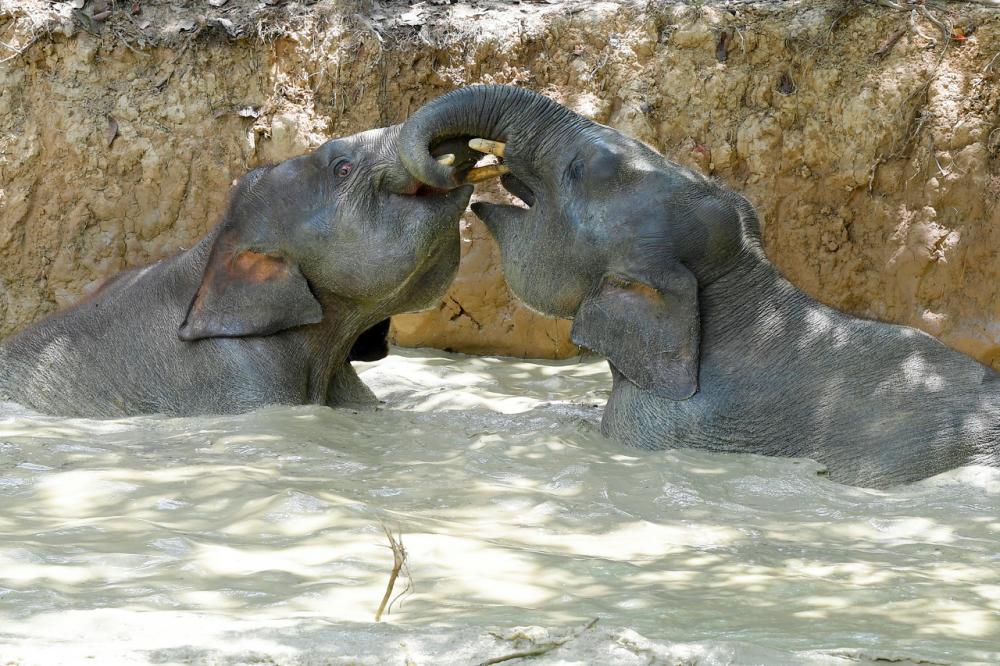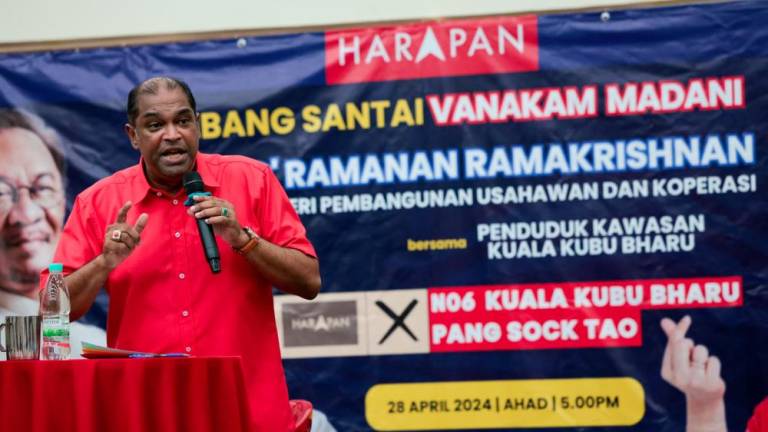By ROHANA NASRAH
There seems to be no end to elephant slaying in Sabah, with the latest grim “episode” involving the discovery of a badly mutilated carcass in Tongod. This is the final of two articles on the efforts being taken by the state authorities and non-governmental organisations to protect Sabah’s endangered pygmy elephants.
KOTA KINABALU, Feb 17: Their peaceful nature has earned them the ‘gentle giant’ moniker. Sadly, Sabah’s Borneo pygmy elephant – an elephant subspecies found mainly on the island of Borneo – population is declining fast due to habitat loss and the never-ending human-animal conflict.
Now and then reports emerge of villagers and plantation workers stumbling on the remains of elephants that died of various causes, including poaching, poisoning and revenge or retaliation killing.
The latest is the badly mutilated carcass of an elephant that was discovered in an oil palm plantation in Tongod, Kinabatangan, on Jan 20.
Proactive measures
To be fair, the Sabah government has taken several proactive measures in collaboration with various related agencies to save the Borneo pygmy elephant.
Last year, it approved the Sabah State Elephant Action Plan 2020-2029 to, among others, protect and conserve the pygmy elephant species. Its current population is estimated to be between 1,500 and 2,000.
As part of the action plan, the state government, through the Sabah Wildlife Department (SWD) in collaboration with several non-governmental organisations (NGOs), has developed the Borneo Elephant Sanctuary which is situated on Lot 8 of the Kinabatangan Wildlife Sanctuary.
The Borneo pygmy elephant is a fully protected species under the First Schedule of the Sabah Wildlife Conservation Enactment 1997.
In 2016, the state government amended the enactment to provide for stiffer penalties for offences committed against wildlife. Under Section 25 (1) of the enactment, convicted offenders face a fine of up to RM250,000 and a jail term of not less than five years.
Several NGOs in Sabah are also actively involved in conservation efforts involving the pygmy elephant and are committed to sustaining its population.
Among them is Seratu Aatai which has carried out a scientific study to understand how to build an elephant-friendly landscape, especially outside protected areas, as well as to educate the local communities on the importance of getting to know the elephants better and protecting and conserving them.
Other NGOs focusing on the Borneo elephant issue include HUTAN, Forever Sabah, international conservation organisation WWF-Malaysia and Responsible Elephant Conservation Trust.
Despite their commitment and efforts, there is still no end to the man-elephant conflict in the Land Below the Wind where humans continue to lay traps or kill the “gentle giants” for ravaging their land and destroying their crops.
Victims of circumstances
In Sabah, conflicts between man and elephant have existed since the 1960s when people started encroaching into jungles for agricultural development, particularly for the cultivation of oil palm.
The diminishing size of their natural habitats left the elephants with no other choice but to venture into the nearby plantations in search of food. These animals, clearly, are victims of circumstances and can hardly be blamed for wrecking human property.
“The truth is, forests are the original habitats of the elephants,” declared WWF-Malaysia elephant conservation manager Dr Cheryl Cheah.
“The impact from the shrinking forest area due to exploitation of land for the cultivation of oil palm, bananas and tapioca has caused the elephants to emerge from the jungle in search of food at nearby human settlements and plantations.”
Cheah said on average, a Borneo elephant has to eat up to 150 kilogrammes of plants and drink 200 litres of water a day, hence the need for them to forage huge areas to fulfill their biological requirements.
These elephants live in herds of three to 30 animals. Naturally, the bigger the herd, the bigger the area they would have to forage for food and water.
Coexistence
According to Cheah, the installation of electric fencing on the forest borders to prevent elephants from leaving their habitat is not sustainable over the long term due to its high costs.
She sees harmonious coexistence between man and elephant as the one and only solution to their ongoing conflict.
For this to happen, all farm and plantation owners must be willing to share their space with the wild elephants, without leaving it entirely to SWD to forge the coexistence.
“The owners themselves must take the initiative to set up their own units to patrol their plantations to prevent elephants from destroying their crops.
“They should inform the Wildlife Department immediately when they detect elephants in their area. The owner or individuals should not take the matter into their own hands,” said Cheah.
She said WWF-Malaysia has taken the initiative to install satellite collars on 20 Borneo elephants to detect their location and movements. The information will be used to prepare proposals for the government and plantation owners on proper land-use strategies, including the installation of electric fencing and establishment of wildlife corridors to prevent man-elephant conflicts.
Indeed, as Cheah admitted, these conflicts have a great impact not only on the endangered mammal’s population but also on the economy of smallholders who cannot afford to erect electric fences to prevent the wild animals from destroying their crops, which is their sole source of livelihood.
Working together to overcome conflict
Cheah, meanwhile, urged all the organisations concerned to work together and try out various alternatives that can, over the long term, lead to a win-win situation.
“We must enhance efforts to promote human-wildlife coexistence by understanding the cause of their conflict, as well as studying effective ways to reduce the conflict,” she said.
Citing the efforts taken by Sabah Softwoods Bhd, Cheah said the plantation company has built a wildlife corridor covering 1,067 hectares of land. The corridor, located between the Ulu Segama and Ulu Kalumpang forest reserves in Tawau, is among the proactive measures taken to reduce conflicts between man and animal.
“To help communities affected by these conflicts, SWD has trained them how to safely lead the Borneo elephants back to the forest.
The people have also set up elephant monitoring teams in the plantations concerned,” she added.
On the causes of death of elephants found dead in Sabah, Cheah said while more detailed investigations need to be carried out to establish the cause of death, the Sabah State Elephant Action Plan 2020-2029 has identified man-elephant conflicts and poisoning as among the reasons for their death.
“Elephants found shot dead are most likely due to man-elephant conflicts because of the destruction to crops and property. Or it can also be the work of poachers.
“Deaths caused by suspected poisoning can be either deliberate or accidental. As investigated by SWD, chronic poisoning can occur due to the use of chemical substances in plantations,” she said.
Eyes and ears
Whilst giving its full support to SWD’s efforts to investigate elephant deaths and bring the perpetrators to book, WWF-Malaysia is also part of a multi-agency enforcement team that has been set up to monitor poaching activities in the state. Besides WWF-Malaysia, the team also comprises enforcement personnel from SWD, Sabah Forestry Department and Sabah Foundation, and the police.
The public also has a crucial role to play by being the “eyes and ears” of the enforcement authorities and reporting any suspicious activity or providing information on poaching activities.
Cheah is optimistic that collaboration among the authorities, industries and public would have a positive impact on Sabah’s wildlife populations.
“The Borneo elephant is facing the threat of extinction, with its population in Sabah estimated at less than 2,000.
“At the end of the day, only tolerance and the willingness (of humans) to coexist harmoniously can ensure the survival of the Borneo pygmy elephant species,” she added.- Bernama










